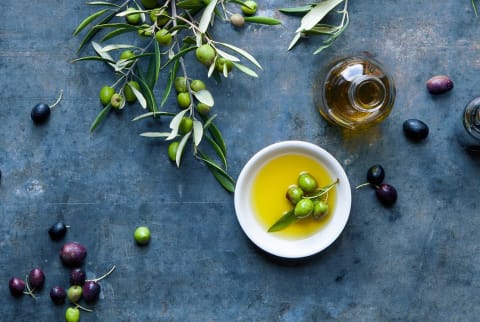Advertisement
3 Brain-Healthy Cooking Fats To Keep In The Kitchen, From An MD


Those who want to keep their car's engine running at top speed are usually willing to spend a little more on higher-quality motor oil. The same analogy applies to the oils you use for cooking.
Don't undo all the work you're doing to improve your diet by using fake or ultra-saturated fats in your meal prep. Instead, go for brain-healthy, organic monounsaturated fats. Buy smaller bottles and store them away from direct sunlight to prevent them from oxidizing. Also use the lowest heat possible when cooking with those fats to enhance nutrient absorption from your favorite rainbow veggies.
While there are many cooking fats available, I recommend sticking to three: olive oil, grass-fed butter, and coconut oil.
Olive Oil
It's said that what's good for the heart is good for the brain—and olive oil, which contains a special phytonutrient called hydroxytyrosol, protects your blood vessels to keep both your cardiovascular and nervous systems in top working order.
There's a reason health experts agree this should be a part of any healthy diet. Olive oil is also a cornerstone of the Mediterranean diet and has not only been shown to help prevent and manage depressive symptoms but also to fight inflammation.
Grab a bottle of extra-virgin olive oil (EVOO), which has more of the phytonutrients you seek. If you have recipes that require higher heat, grab a refined olive oil with a higher smoke point.
Grass-Fed Butter
Leave the margarine or other whipped vegetable oil spreads on the grocery shelf. Grass-fed butter not only offers a richer, creamier flavor but also has the healthy fats that assist in building muscle and brain cells.
In addition, grass-fed butter contains other vitamins and minerals that play a vital role in brain development and maintenance. If you're looking to be a little adventurous, you can also try ghee, the clarified butter used in traditional Indian recipes. It has a higher smoke point than butter and a lovely nutty flavor that brings that little something extra to fish or veggie dishes.
Coconut Oil
This oil is also free of undesired trans fats and is a great option for your favorite stir-fries. While its status as a superfood remains controversial, coconut oil has been shown to have some anti-inflammatory properties and is comprised of medium-chain triglycerides (MCTs). These fats are being researched to help with brain energy consumption in Alzheimer's disease and are used by people eating keto to help them stay in ketosis.